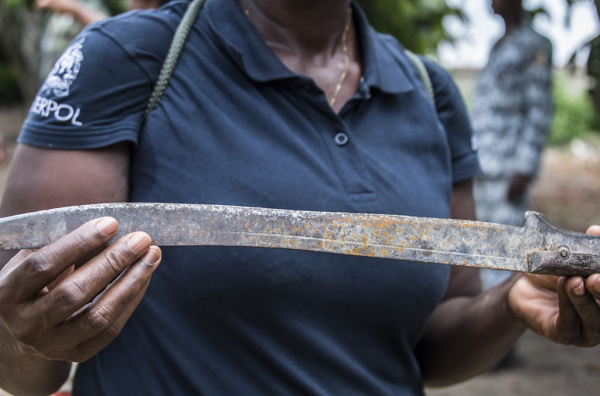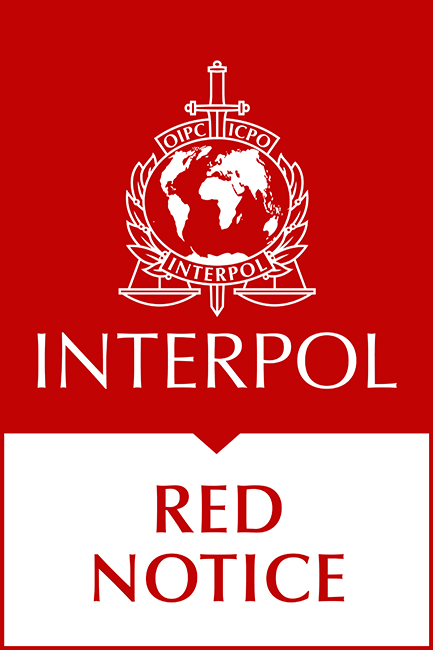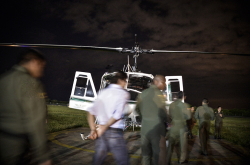The issues
Crimes such as genocides, crimes against humanity and war crimes are of serious concern to the international community.
As well as the devastating effect on families concerned, these crimes have a lasting, destabilizing impact on the safety and security of communities, nations and regions for decades after they occur.
Investigation and prosecution of these crimes are central to our common fight against impunity.

Our response – operational support
With our global networks and technical tools, we are in a unique position to enhance efforts of law enforcement authorities, international criminal tribunals and national prosecution services to investigate and seek justice for these criminal acts.
We provide operational and investigative support to these partner organizations and to war crimes and fugitive investigators in our member countries.
We promote and facilitate access to our services, technical tools, resources and expertise in the area of serious international crimes. We also support our member countries and partner organizations by sharing information and coordinating international investigations.
Several of our projects on catching fugitives are related to war crimes. These include Project BASIC, and the Rwandan Genocide Fugitives Project (see the Fugitives section).
Our work in this field is defined in agreements with international courts and tribunals, and by resolutions adopted by our governing bodies and those of the United Nations.
Partnerships
Strategic partnerships and specialist networks allow us to share expertise and to maximize the impact of our initiatives on a national and international level.
We have been actively cooperating with the United Nations International Tribunals and the International Criminal Court since 1994. We also participate in genocide networks such as the European Network for investigation and prosecution of genocide, crimes against humanity and war crimes.
These partnerships allow us to leverage legal evolutions and adapt our capacities accordingly – for instance in the area of cultural heritage crime or in retrieving evidence from mobile devices and social media, including in atrocities perpetrated by ISIL (Daesh).
Agreements and resolutions that shape our role in fighting war crimes
Our role in the area of serious international crimes has been clearly defined in agreements signed over the years with international courts and tribunals. This has been further strengthened by resolutions adopted by our governing bodies and those of the United Nations.
- Five of our General Assembly resolutions concern our cooperation with the International Criminal Tribunal for the former Yugoslavia (ICTY), the International Criminal Tribunal for Rwanda (ICTR), the Special Court for Sierra Leone, the International Criminal Court. See AGN/63/RES/9 (1994), AGN/66/RES/10 (1997), AG-2003-RES-08 (2003) and AG-2004-RES-16 (2004), and AG-2009-RES-10 (2009).
- 2004: The 73rd session of our General Assembly held in Cancun called for increased support "for the investigation and prosecution of genocide, war crimes and crimes against humanity". See Resolution AG-2004-RES-17.
- 2007: The 19th African Regional Conference called for all National Central Bureaus to provide whatever assistance necessary to arrest the remaining fugitives wanted by the International Criminal Tribunal for Rwanda.
- 2008: The 37th European Regional Conference called for National Central Bureaus to provide the widest possible assistance to locate and arrest the four remaining fugitives wanted by the International Criminal Tribunal for the former Yugoslavia.
- 2009: The 4th International Expert Meeting on Genocide, War Crimes and Crimes Against Humanity, held in Oslo and attended by war crime units from many of our member countries, recommended that a central repository be created to facilitate sharing of information relative to serious international crimes investigations throughout the world.
- 2010: The 79th session of our General Assembly held in Doha passed a resolution which further developed the manner in which we handle new requests for Red Notices related to genocide, crimes against humanity and war crimes. See resolution AG-2010-RES-10.
See also





